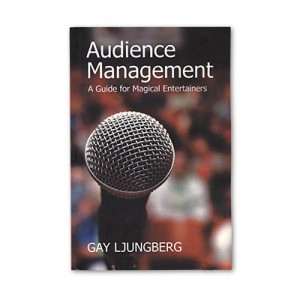The Blurb
A Guide for Magical Entertainers
In this book, Gay Ljungberg shares his performing experience
with the reader and reveals a treasure of valuable secrets,
about the psychology and the techniques he uses. He teaches
you how to select assistants from the audience and how you
turn them into instant actors to play with on stage. You
will learn how to conquer your stage fright, how to connect
with your audience and how to design a strategy for success.
You will also discover the secrets of crowd control and
stage presence.
Whether you are a performing magician, clown, juggler,
ventriloquist, or stand in front of an audience for any
other reason; you can improve your act by reading this book.
“I want the reader to become a better performer, by focusing
on the audience and learning to connect and communicate.” –
Gay Ljungberg
Pages: 143 – Softbound


My Comments
THIS is the book that I've wanted to write for quite some
time. THIS is the book that every performer should have.
More experienced performers will probably know most of the
information in this book, but I'd advise them to get this at
least to know what to advise those with less experience.
Basically, the book maintains that it all boils down to the
audience. It's not what the performer enjoys doing on
stage, but what the audience enjoys. It's connecting with
that audience that matters. Who cares that you know fifty
three different types of billet moves? Your audience
doesn't and you shouldn't be creating acts just to show them
off. They only care about having their minds blown by
having their minds read and having a great experience. A
truly great performer must know how to communicate this.
Okay, this book focuses on magicians mostly, but substitute
the phrases "card sleights" and "minds blown by magic" with
"billet moves" and "minds blown by having their minds read"
and the information still applies.
As I alluded, I totally agree. When entertaining people,
it's the audience that should come first when scripting and
creating an act. Sell the audience on who you are and what
you do. Make a connection to the audience so that they'll
remember you. Perform effects that the audience finds
powerful, not ones that necessarily you want to do.
This book takes this stance and explains how to make that
connection, as well as some very other important audience
management techniques. It also explores how to overcome
stage fright and this book has some of the best advice I've
seen on the subject.
Another topic it explores is the use of, and the selection
of, participants for the act. There are some excellent
points made here. Selecting the wrong participants can
truly ruin your entire act. I do have an additional
viewpoint which isn't stressed as much in this book as I
would have had I written the book. When I choose
participants, most of the time I'm looking for someone who's
paying attention and not falling asleep as well as smiling
and showing that they're having a good time.
The only major consideration for this book is that it takes
the viewpoint of the magician and talks about the visuals of
magic. Mentalism doesn't have magical visuals, but there is
enough advice and you can certainly "read between the lines"
and adapt the info which is specific to magic to become
appropriate advice for mentalism. (And, no, that doesn't
mean making mentalism more visual!)
There are eleven sections in this book: Starting Point, The
Focus, Homo Ludens, The Invisible Contract, Stage Presence -
To Have "It," Conquer Stage Fright, Connect with People,
Assistants on Stage, Crowd Control, Strategy for Success,
and Learning Games.
If you feel that you are not getting the desired reaction
from the audience that you'd like to receive, or feel that
your act just doesn't "knock it out of the ballpark" the way
you're envisioning it, then this book should give you some
invaluable advice and is highly recommended. If you're
already a pro, and don't need the advice, you may want to
look into it, as I mentioned above, just so that you know
what book to recommend to someone who does need such advice
or wish to give it yourself.